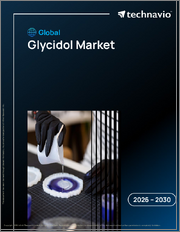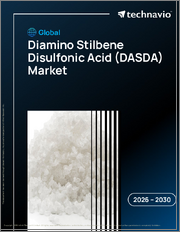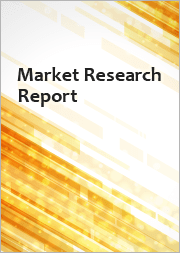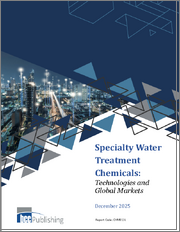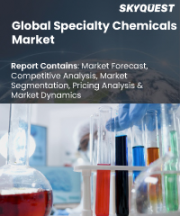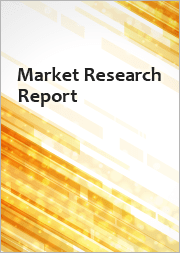
|
시장보고서
상품코드
1670444
글리시돌 시장 규모, 점유율, 성장 분석 : 용도별, 제제 유형별, 유통 채널별, 최종 이용 산업별, 지역별 - 산업 예측(2025-2032년)Glycidol Market Size, Share, and Growth Analysis, By Application (Solvents, Adhesives), By Formulation Type (Liquid, Solid), By Distribution Channel, By End Use Industry, By Region - Industry Forecast 2025-2032 |
||||||
글리시돌 시장 규모는 2023년 7억 5,000만 달러로 평가되었습니다. 또한, 2024년 7억 9,000만 달러에서 2032년에는 11억 8,000만 달러로 성장하고, 예측 기간(2025-2032년) 동안 5.2%의 연평균 복합 성장률(CAGR)을 보일 것으로 예측됩니다.
글리시돌 시장은 제약 산업에서 광범위한 응용 분야, 특히 의약품 합성 및 의약품 활성 성분(API)의 중간체로서의 응용 분야로 인해 큰 성장이 예상됩니다. 의약품 연구 개발 및 제조 확대에 대한 투자 증가가 이러한 추세의 주요 요인으로 작용하고 있습니다. 또한, 폴리머, 에폭시 수지, 코팅제에 대한 수요 증가는 글리세롤 시장에서의 입지를 더욱 강화할 것으로 예상됩니다. 계면활성제에 대한 수요가 증가하고 있는 퍼스널케어 분야와 세계 산업화의 발전은 글리세롤 공급업체에게 유망한 기회를 제공합니다. 그러나 안전에 대한 우려, 엄격한 규제, 생산 비용 등의 문제가 성장에 걸림돌이 될 수 있으며, 최근 AbbVie의 사업 확장과 같은 제조업에 대한 대규모 투자는 다양한 산업에서 글리시돌의 채택 가능성을 강조하고 향후 매출 전망을 강화할 것으로 보입니다.
목차
서론
- 조사 목적
- 조사 범위
- 정의
조사 방법
- 정보 조달
- 2차와 1차 데이터 방법
- 시장 규모 예측
- 시장 전제조건과 제한
주요 요약
- 세계 시장 전망
- 공급과 수요 동향 분석
- 부문별 기회 분석
시장 역학과 전망
- 시장 개요
- 시장 규모
- 시장 역학
- 성장 촉진요인과 기회
- 성장 억제요인과 과제
- Porter의 Five Forces 분석
주요 시장 인사이트
- 중요 성공 요인
- 경쟁 정도
- 주요 투자 기회
- 시장 생태계
- 시장의 매력 지수(2024년)
- PESTEL 분석
- 거시경제 지표
- 밸류체인 분석
- 가격 분석
- 사례 연구
- 규제 상황
- 특허 분석
글리시돌 시장 규모 : 용도별
- 시장 개요
- 용제
- 접착제
- 코팅제
- 가소제
- 중간체
글리시돌 시장 규모 : 제제 유형별
- 시장 개요
- 액체
- 고체
- 겔
글리시돌 시장 규모 : 유통 채널별
- 시장 개요
- 온라인
- 오프라인
- 직접 판매
글리시돌 시장 규모 : 최종 이용 산업별
- 시장 개요
- 화학제품
- 의약품
- 화장품
- 식품 및 음료
- 농업
글리시돌 시장 규모
- 북미
- 미국
- 캐나다
- 유럽
- 독일
- 스페인
- 프랑스
- 영국
- 이탈리아
- 기타 유럽
- 아시아태평양
- 중국
- 인도
- 일본
- 한국
- 기타 아시아태평양
- 라틴아메리카
- 브라질
- 기타 라틴아메리카
- 중동 및 아프리카
- GCC 국가
- 남아프리카공화국
- 기타 중동 및 아프리카
경쟁 정보
- 주요 5개사 비교
- 주요 기업의 시장 포지셔닝(2024년)
- 주요 시장 기업이 채택한 전략
- 최근 시장 동향
- 기업의 시장 점유율 분석(2024년)
- 주요 기업 개요
- 기업 상세
- 제품 포트폴리오 분석
- 기업 부문별 점유율 분석
- 매출 전년대비 비교(2022-2024년)
주요 기업 개요
- BASF SE(Germany)
- Dow Chemical Company(USA)
- Solvay S.A.(Belgium)
- Arkema Group(France)
- Huntsman Corporation(USA)
- Evonik Industries AG(Germany)
- SABIC(Saudi Arabia)
- Clariant AG(Switzerland)
- Akzo Nobel N.V.(Netherlands)
- Ashland Global Holdings Inc.(USA)
- Eastman Chemical Company(USA)
- LG Chem Ltd.(South Korea)
- Sumitomo Chemical Co., Ltd.(Japan)
- LyondellBasell Industries N.V.(Netherlands)
- Chevron Phillips Chemical Company(USA)
- Mitsui Chemicals, Inc.(Japan)
- PPG Industries, Inc.(USA)
- Wacker Chemie AG(Germany)
결론과 제안
LSH 25.04.23Glycidol Market size was valued at USD 0.75 billion in 2023 and is poised to grow from USD 0.79 billion in 2024 to USD 1.18 billion by 2032, growing at a CAGR of 5.2% during the forecast period (2025-2032).
The glycidol market is poised for significant growth, driven by its extensive applications in the pharmaceutical industry, particularly as an intermediate for drug synthesis and active pharmaceutical ingredients (APIs). Increased investments in pharmaceutical R&D and manufacturing expansion are key contributors to this trend. Additionally, the rising demand for polymers, epoxy resins, and coatings will further enhance glycidol's market presence. The personal care sector, with heightened demand for surfactants, and the global surge in industrialization also present promising opportunities for glycidol suppliers. However, challenges such as safety concerns, stringent regulations, and production costs may hinder growth. Major investments in manufacturing, like AbbVie's recent expansion, highlight the potential for glycidol's increasing adoption across various industries, bolstering future sales prospects.
Top-down and bottom-up approaches were used to estimate and validate the size of the Glycidol market and to estimate the size of various other dependent submarkets. The research methodology used to estimate the market size includes the following details: The key players in the market were identified through secondary research, and their market shares in the respective regions were determined through primary and secondary research. This entire procedure includes the study of the annual and financial reports of the top market players and extensive interviews for key insights from industry leaders such as CEOs, VPs, directors, and marketing executives. All percentage shares split, and breakdowns were determined using secondary sources and verified through Primary sources. All possible parameters that affect the markets covered in this research study have been accounted for, viewed in extensive detail, verified through primary research, and analyzed to get the final quantitative and qualitative data.
Glycidol Market Segments Analysis
Global Glycidol Market is segmented by Application, Formulation Type, Distribution Channel, End Use Industry and region. Based on Application, the market is segmented into Solvents, Adhesives, Coatings, Plasticizers and Intermediates. Based on Formulation Type, the market is segmented into Liquid, Solid and Gel. Based on Distribution Channel, the market is segmented into Online, Offline and Direct Sales. Based on End Use Industry, the market is segmented into Chemical, Pharmaceuticals, Cosmetics, Food and Beverage and Agriculture. Based on region, the market is segmented into North America, Europe, Asia Pacific, Latin America and Middle East & Africa.
Driver of the Glycidol Market
The Glycidol market is experiencing substantial growth driven by the increasing demand for various specialty chemicals globally. This heightened interest is prompting significant investments in both public and private sectors focused on research and development. Companies are actively investigating the diverse applications of glycidol, aiming to produce high-performance materials and biocompatible coatings in the future. This trend not only illustrates the potential for innovation within the industry but also highlights glycidol's key role in advancing materials technology and enhancing product performance across multiple applications, ultimately fostering a dynamic and competitive market landscape.
Restraints in the Glycidol Market
The glycidol market faces notable restraints primarily due to rising concerns about environmental pollution, which has led to stringent regulations governing the production, handling, and disposal of this compound. Given glycidol's potentially toxic properties and effects on the environment, these regulations are becoming increasingly stringent. Compliance with such regulations poses a significant challenge for glycidol manufacturers, as it can escalate operational costs and subsequently impact profitability. Therefore, as companies strive to adhere to these environmental guidelines, they may encounter financial strains that could hinder their overall market performance and growth prospects.
Market Trends of the Glycidol Market
The Glycidol market is witnessing a significant upward trend, driven by the burgeoning applications of glycidol in biomedical and drug delivery systems. As healthcare continues to evolve, the demand for innovative drug formulations and delivery mechanisms is increasing. Glycidol derivatives are emerging as key players in enhancing drug efficacy and improving patient outcomes, prompting market providers to actively invest in research and development. This focus on R&D is expected to unlock new avenues for glycidol utilization, positioning the glycidol market as a lucrative opportunity for investors and businesses looking to capitalize on advancements in biomedicine and pharmaceutical technologies throughout the forecast period and beyond.
Table of Contents
Introduction
- Objectives of the Study
- Scope of the Report
- Definitions
Research Methodology
- Information Procurement
- Secondary & Primary Data Methods
- Market Size Estimation
- Market Assumptions & Limitations
Executive Summary
- Global Market Outlook
- Supply & Demand Trend Analysis
- Segmental Opportunity Analysis
Market Dynamics & Outlook
- Market Overview
- Market Size
- Market Dynamics
- Drivers & Opportunities
- Restraints & Challenges
- Porters Analysis
- Competitive rivalry
- Threat of substitute
- Bargaining power of buyers
- Threat of new entrants
- Bargaining power of suppliers
Key Market Insights
- Key Success Factors
- Degree of Competition
- Top Investment Pockets
- Market Ecosystem
- Market Attractiveness Index, 2024
- PESTEL Analysis
- Macro-Economic Indicators
- Value Chain Analysis
- Pricing Analysis
- Case Studies
- Regulatory Landscape
- Patent Analysis
Global Glycidol Market Size by Application & CAGR (2025-2032)
- Market Overview
- Solvents
- Adhesives
- Coatings
- Plasticizers
- Intermediates
Global Glycidol Market Size by Formulation Type & CAGR (2025-2032)
- Market Overview
- Liquid
- Solid
- Gel
Global Glycidol Market Size by Distribution Channel & CAGR (2025-2032)
- Market Overview
- Online
- Offline
- Direct Sales
Global Glycidol Market Size by End Use Industry & CAGR (2025-2032)
- Market Overview
- Chemical
- Pharmaceuticals
- Cosmetics
- Food and Beverage
- Agriculture
Global Glycidol Market Size & CAGR (2025-2032)
- North America (Application, Formulation Type, Distribution Channel, End Use Industry)
- US
- Canada
- Europe (Application, Formulation Type, Distribution Channel, End Use Industry)
- Germany
- Spain
- France
- UK
- Italy
- Rest of Europe
- Asia Pacific (Application, Formulation Type, Distribution Channel, End Use Industry)
- China
- India
- Japan
- South Korea
- Rest of Asia-Pacific
- Latin America (Application, Formulation Type, Distribution Channel, End Use Industry)
- Brazil
- Rest of Latin America
- Middle East & Africa (Application, Formulation Type, Distribution Channel, End Use Industry)
- GCC Countries
- South Africa
- Rest of Middle East & Africa
Competitive Intelligence
- Top 5 Player Comparison
- Market Positioning of Key Players, 2024
- Strategies Adopted by Key Market Players
- Recent Developments in the Market
- Company Market Share Analysis, 2024
- Company Profiles of All Key Players
- Company Details
- Product Portfolio Analysis
- Company's Segmental Share Analysis
- Revenue Y-O-Y Comparison (2022-2024)
Key Company Profiles
- BASF SE (Germany)
- Company Overview
- Business Segment Overview
- Financial Updates
- Key Developments
- Dow Chemical Company (USA)
- Company Overview
- Business Segment Overview
- Financial Updates
- Key Developments
- Solvay S.A. (Belgium)
- Company Overview
- Business Segment Overview
- Financial Updates
- Key Developments
- Arkema Group (France)
- Company Overview
- Business Segment Overview
- Financial Updates
- Key Developments
- Huntsman Corporation (USA)
- Company Overview
- Business Segment Overview
- Financial Updates
- Key Developments
- Evonik Industries AG (Germany)
- Company Overview
- Business Segment Overview
- Financial Updates
- Key Developments
- SABIC (Saudi Arabia)
- Company Overview
- Business Segment Overview
- Financial Updates
- Key Developments
- Clariant AG (Switzerland)
- Company Overview
- Business Segment Overview
- Financial Updates
- Key Developments
- Akzo Nobel N.V. (Netherlands)
- Company Overview
- Business Segment Overview
- Financial Updates
- Key Developments
- Ashland Global Holdings Inc. (USA)
- Company Overview
- Business Segment Overview
- Financial Updates
- Key Developments
- Eastman Chemical Company (USA)
- Company Overview
- Business Segment Overview
- Financial Updates
- Key Developments
- LG Chem Ltd. (South Korea)
- Company Overview
- Business Segment Overview
- Financial Updates
- Key Developments
- Sumitomo Chemical Co., Ltd. (Japan)
- Company Overview
- Business Segment Overview
- Financial Updates
- Key Developments
- LyondellBasell Industries N.V. (Netherlands)
- Company Overview
- Business Segment Overview
- Financial Updates
- Key Developments
- Chevron Phillips Chemical Company (USA)
- Company Overview
- Business Segment Overview
- Financial Updates
- Key Developments
- Mitsui Chemicals, Inc. (Japan)
- Company Overview
- Business Segment Overview
- Financial Updates
- Key Developments
- PPG Industries, Inc. (USA)
- Company Overview
- Business Segment Overview
- Financial Updates
- Key Developments
- Wacker Chemie AG (Germany)
- Company Overview
- Business Segment Overview
- Financial Updates
- Key Developments






